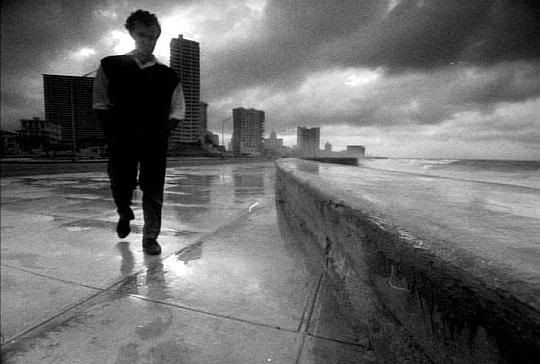
Few movies are as legendary as Soy Cuba in how ahead of their time they were, prophets bearing visions from a cinema almost unthinkable at the time in the US for anyone whose name wasn't Welles (and, by the time Soy Cuba came out, Welles had been all but banished from the US and forced to pine for his movies in Europe), few such faith-restoring Holy Grails for the sheer visual power of cinema. My usual problem with Kalatozov, this time amplified by the propaganda nature of a film comisssioned by Castro's Cuba from its newfound Soviet allies and filmed by Soviet crews from Mosfilm Studios on location in Cuba, is that his subject matter keeps me at a distance. But at the same time, what dazzling displays of cinematic fireworks his movies are! No one films a clouded sky like his DP, Sergei Urusevsky, with that pristine quality dreamlike and supine, and no one has ever made a camera seem more alive dynamic and freewheeling than you'll find in Kalatozov's movies. There were times the movie made me wonder in awe with jaw agape as to where the camera was mounted, how it seemed to float in the air above a crowded street, having already tracked up four stories and across the street and through a room and out the balcony, hovering suspended in the air as though by an act of sheer cinematic will, amazing if just for the blocking and coordination it would have required. As someone who's indifferent/opposed to Communism on a practical level, Soy Cuba's best case for the power of collective strength does not come through in the agitprop subject matter, the onedimensional depiction of hard edged patriotic Cuban guerillas fighting against all odds and oppressed peasants having their land stolen by rich landowners and student radicals rioting in the streets against the fascist police and being shot down by them, this in itself borderline succesful not because it imitates real life because a propaganda piece cannot replicate real life but because it imitates melodrama we're already vaguely familiar from other movie plots; Soy Cuba's best showcase of Soviet will comes in the amazing cooperation it must have taken to make the camera move the way it does. If Soy Cuba is a celebration of Communist ideals, a failure as a narrative because of the intellectual dishonesty necessary in concocting a propaganda film, it's also a celebration of amazing cinema, a success despite itself, not for plot drama or characters, but for the simple joy of staging beautiful elaborate images, for the amazing camerawork, for the stark black and white cinematography, a lot of it self-indulgent, the camera moving for the sake of movement and the joy of it, the actors treated as little more than walking props the camera can circle around and play against. In many ways, Soy Cuba is a study in choreography for camera and blocking. When Kalatozov introduces a blurry dreamlike flashback it seems to swim out of the head of the character who experiences it. When the same character torches his own cane field, Kalatozov orchestrates a vision of hell, the camera itself dancing through swirling flames and billows of black smoke. I can't really praise the visuals enough. As with other Kalatozovs, the story prevents me from tenning it, but from a technical standpoint, this will blow your mind.




Δεν υπάρχουν σχόλια:
Δημοσίευση σχολίου